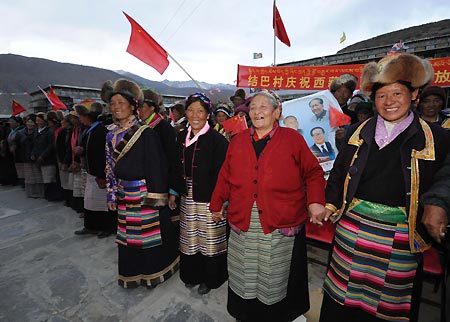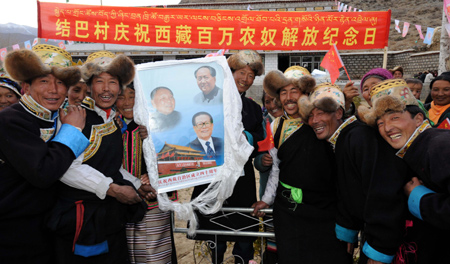An article signed by a 99-year-old former official in the old Tibet praises Serfs Emancipation Day which falls on March 28.
The article written by Ngapoi Ngawang Jigme, once a Galoin (cabinet minister) of the former local government of Tibet, will be published in the People's Daily Tuesday.

People of the Tibetan ethnic group hold a celebration for the upcoming Serfs Emancipation Day, at Jiaba Village of Nedong County, southwest China's Tibet Autonomous Region, March 23, 2009. Tibetan legislators endorsed a motion in January this year designating March 28 as the Serfs Emancipation Day, to commemorate the emancipation of millions of serfs and slaves in Tibet 50 years ago, photo from Xinhua.
Ngapoi was assigned as Tibet's chief negotiator to Beijing in 1951. His job was to reach a peaceful liberation in the Himalayan region by signing a 17-article agreement. He later became secretary general of the Preparatory Committee for the Tibet Autonomous Region.
As part of history, Ngapoi witnessed the collapse of the local government in old Tibet and almost every major event since the democratic reform 60 years ago.
Ngapoi, now Vice-Chairman of the 11th National Committee of the Chinese People's Political Consultative Conference (CPPCC), reviewed the historical changes that occurred in Tibet.
"The Tibetan nationality is a great ethnic group and also an outstanding member of the Chinese people with its splendid history and culture," Ngapoi wrote. "I was born in 1910 and know all about Tibet before the reform."

People of the Tibetan ethnic group hold a celebration for the upcoming Serfs Emancipation Day, at Jiaba Village of Nedong County, southwest China's Tibet Autonomous Region, March 23, 2009, photo from Xinhua.
"The fundamental cause for the success of the reform is that the Communist Party of China has carried out a series of policies which agreed with Tibetan people's primary interests."
The article said the central government understood the historical and present situations in the region and adopted a "step by step" policy to reform the social system of the old Tibet.
The central government's discreet attitude and tolerant policy for the democratic reform eventually won the hearts and minds of the Tibetan people, it said.
During the reform and after the Tibet Autonomous Region was founded in 1965, the central government continued to listen to the voices of Tibetan people who become real masters in managing local affairs by overturning serfdom.
"What impressed me most about the Party's policies on ethnic and religious affairs is that all of the officials and troops sent to Tibet showed great respect to Tibetan customs and cultural traditions."
"Even during the unrest of the Cultural Revolution, people living in Tibet still showed loyalty to the central government."
The Vice-Chairman said the central government paid great attention to Tibet's social and economic development after ending the Cultural Revolution and has invested great amounts of money in ecological preservation for sustainable development.
In addition, some monasteries and cultural relics that were damaged during the Cultural Revolution in Tibet had been repaired. The Potala Palace, Tashilhunpo Monastery, Jokhang Monastery and other important temples had been properly repaired and protected.
"Now we commemorate the Serfs Emancipation Day and will let our children remember history and look into the future," Ngapoi said. "The Tibetan people will realize a united, prosperous and harmonious society as long as they depend on the leadership of the Communist Party of China."
